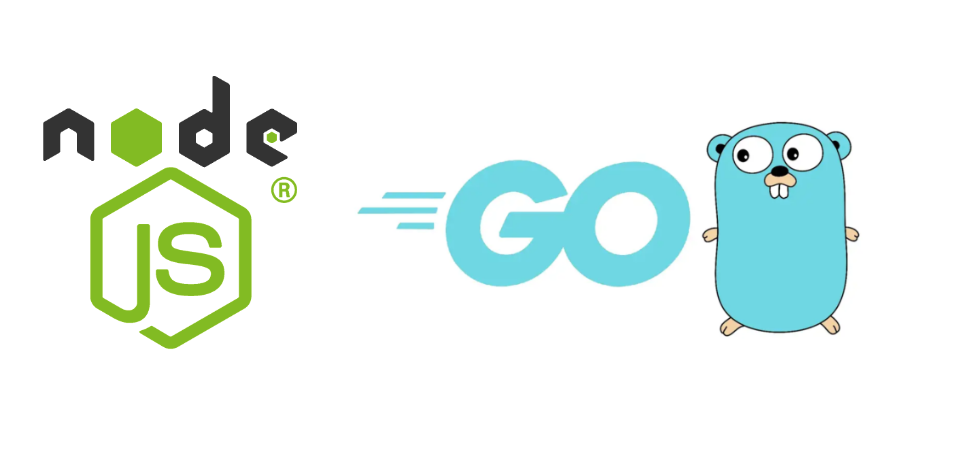Introduction
Picking the right framework and language are very crucial in web development. You have to have the right tool for the right job.
In the world of backend development, Golang and Node.js are two powerful tools. Node.js facilitates JavaScript to the server side while Golang has been making quite a few waves after being implemented by Uber. Both are given a lot of importance in the industry.
But it’s challenging for companies and engineers to decide on the perfect tech stack for any given project. Backend development is a very serious business – one has to carefully consider how one will go about building and scaling APIs, set-up libraries, manage data, and draft less-user-facing code.
Thus, in this article we will delve into Golang and Node.js, first introducing their fundamental identity and then comparing their features.
What is Golang ?
Golang, also known as Go, is an open-source, statistically typed, multi-purpose, cross-platform, compiled, and fast programming language. Developed by the engineers at Google it has been created to solve specific software problems by combining the strengths and eliminating the weaknesses of other programming languages.
It is known for its rich standard library, garbage collection, and dynamic typing. Go’s design focuses on simplicity and ease of use, with syntax and features allow developers to manage complex software with clarity and efficiency.
What is Node.js ?
Node.js is a dynamically-typed runtime environment built on JavaScript, and is great for both backend and frontend development. It is open-source, and an all-purpose tool for running web apps that aren’t in your browser.
With the foundation of Chrome’s V8 JavaScript engine, Node.js provides a versatile and cross-platform solution. Notably, it is an excellent choice for creating a real-time application with two-way connections where the server doesn’t have to wait for the API to return data.
Comparison of Golang and Node.js
Let us now compare Golang and Node.js on the basis of the following parameters:
Performance: Developers claim that the performance of Go is at par with C and C++ which makes sense since it compiles code directly to machine code without an intermediate translator. There is also a built-in garbage collector that automatically frees up unused memory spaces, increasing availability of memory for faster processing. Node.js on the other hand is the top choice for event-based applications that update data in real-time. However, it cannot offer CPU and memory-bound tasks performance. Thus in comparison, Go surpasses Node.js in regards to the speed of performance and how quickly it compiles and executes instructions.
Scalability and Concurrency: Go uses goroutines, which allow reliable and easy execution of threads. It can process more than 1,000 requests per second in terms of concurrency. In comparison Node.js is a single-threaded asynchronous engine.
Benchmarks: Golang and Node.js can be tested on various parameters for comparison. According to Intellectsoft, Golang takes less time, memory, and CPU load to perform operations as compared to Node.js.
Error Handling: Node.js handles errors using the try-catch technique, where errors are caught just when they occur, and developers can debug errors quickly and faster. Golang separates compile-time and runtime errors differently which causes confusion during debugging. Even though the situation may improve with version 2 of Go, Node.js for now is better than Golang here.
Difficulty Level in Learning: Node.js is easier to learn than Golang since it uses JavaScript which has been used by developers for a long time. There are also more Node.js courses and contents available on the internet.
Community: Both Node.js and Golang are open source with extensive developer support and communities. However Node.js is the more mature tool with a stronger and larger community.
Development Tools: The availability of libraries and tools for numerous tasks and projects cuts down the development time and cost. Node.js is supreme when it comes to the availability of tools. Golang is new and although there are great tools for solving specific tasks, there aren’t as many as Node.js.
Salary and Availability of Developers: Finding Go developers can be a hard task, since it is relatively new. Node.js on the other hand, is already very popular, thanks to the JavaScript ecosystem. Golang pays very high because of its scarcity and promise and may challenge Node.js one day.
Final Takeaways
Both Golang and Node.js bring their own strengths to the table. Golang shines in performance and simplicity which makes it great for scalable applications while Node.js offers more flexibility and a rich ecosystem.
The decision between Go and Node.js comes down to what your project needs, how fast you need things done, and what your team knows best. If you have big projects and want them to run quickly and smoothly, Go is recommended. Node.js is preferred when you have to develop real-time applications and require large supporting libraries.
So consider the type of web application you are envisioning and factor in the technical and business issues before making a prudent decision !
Image Sourced from Net
